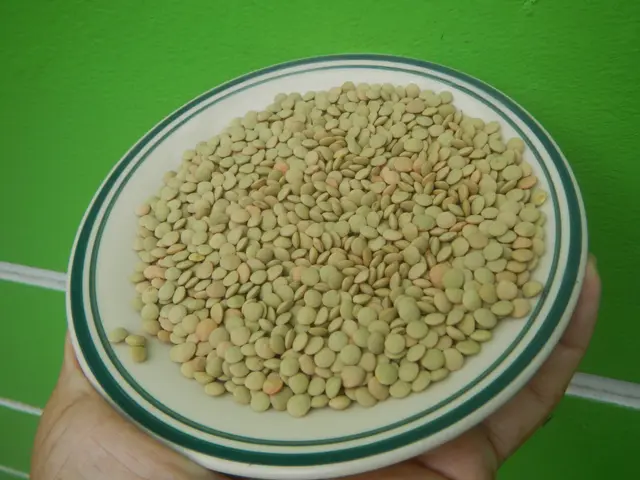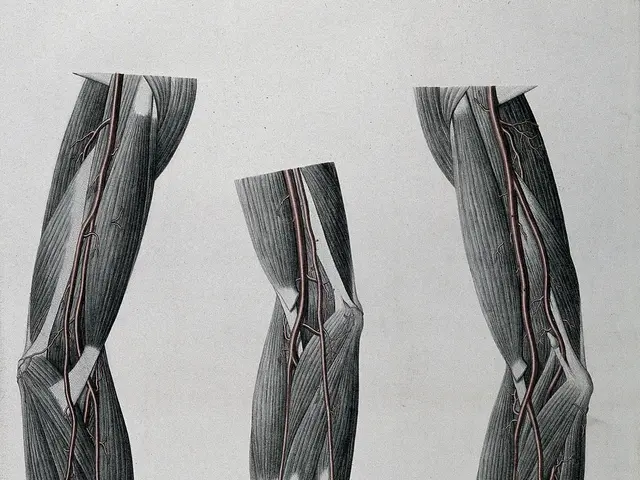SCD (Specific Carbohydrate Diet) and Ulcerative Colitis: Advantages, Drawbacks, and Additional Information
The Specific Carbohydrate Diet (SCD) and Managing Ulcerative Colitis
The Specific Carbohydrate Diet (SCD) is a strict elimination diet that promotes unprocessed and nutrient-rich foods, often used in managing inflammatory bowel diseases like ulcerative colitis. The diet, first developed by Dr. Sidney Haas to treat celiac disease, aims to reduce intestinal inflammation and symptoms by avoiding foods that may feed harmful gut bacteria or exacerbate irritation.
Ulcerative colitis is a chronic condition characterized by persistent colon inflammation, caused by environmental triggers and genetics leading to abnormal immune responses in the gut. Symptoms include abdominal pain, blood or mucus in stool, and a constant urge to pass stools.
The SCD diet restricts complex carbohydrates because they are harder to digest and can contribute to inflammation, malabsorption, and diarrhea. Instead, it encourages the consumption of easily digestible simple carbohydrates to promote gut healing.
Benefits of SCD for ulcerative colitis may include: - Improved digestion and reduced diarrhea or bloating by removing difficult-to-digest carbohydrates. - Potential reduction in gut inflammation and symptom relief during flare-ups by avoiding processed and inflammatory foods. - Inclusion of fermented foods (like certain yogurts or kefir) providing probiotics to support gut microbiota balance.
Potential challenges with SCD: - It can be restrictive and difficult to follow long-term given the exclusion of many common grains and starches. - Nutritional imbalances or deficiencies if not carefully planned, especially in fiber and certain vitamins. - Mixed clinical evidence; while some find symptom improvement, strong large-scale trials are lacking, and individual responses vary.
Recommended foods to eat on SCD typically include: - Fruits like bananas, ripe mangoes, peeled apples, and watermelon (well-tolerated in ulcerative colitis). - Vegetables that are well-cooked and lower in fiber, such as roasted carrots and cooked spinach. - Low-lactose, fermented dairy such as aged cheeses, Greek yogurt, and kefir to support gut health. - Proteins such as meat, fish, and eggs (often unprocessed and free of added starches).
Foods to avoid on SCD include: - All grains and starches such as wheat, corn, rice, and potatoes. - Processed foods, refined sugars (except some natural monosaccharides like honey in moderation). - High-lactose dairy products that may irritate the gut. - High-fiber raw vegetables and fruits that can exacerbate symptoms during flare-ups.
It's worth noting that people with inflammatory bowel diseases like Crohn's disease, diverticulitis, and cystic fibrosis also follow the SCD diet. However, the high fiber content of SCD may cause bowel obstruction in people with Crohn's disease who have small bowel strictures.
During a flare, a person may have to return to the initial steps of the SCD diet, which focuses on foods that are easy to digest and do not aggravate inflammation. Doctors will closely monitor the person's symptoms and perform any checks where necessary during the food reintroduction phase.
People with IBD are at risk of nutritional deficiency, making it harder for them to gain weight. To prevent a nutritional deficiency that may come with restrictive diets such as SCD, it's essential to ensure adequate nutrition from food substitutes and vitamin supplements allowed in the diet.
Once individuals start gaining weight and doctors begin to see clinical improvements, they can decrease their follow-up appointments to every 2-4 weeks. A substantial change in the fecal microbiome in a person with ulcerative colitis was observed within 2 weeks of starting SCD.
Other IBD diets that can benefit a person with ulcerative colitis include low FODMAP diet, paleo diet, gluten-free diet, Mediterranean diet, anti-inflammatory diet, and autoimmune protocol diet. Consulting a healthcare provider or dietitian is advised for personalized guidance.
In summary, the Specific Carbohydrate Diet is a specialized nutritional strategy aiming to reduce gut inflammation and symptoms in ulcerative colitis by eliminating complex carbohydrates and processed foods, while focusing on tolerated fruits, vegetables, fermented dairy, and proteins. It requires careful implementation and can offer benefits for some patients but also poses challenges and lacks definitive large-scale clinical proof.
- The Specific Carbohydrate Diet (SCD) is an established dietary approach used to manage medical-conditions like ulcerative colitis.
- The SCD aims to reduce intestinal inflammation and symptoms in persona with ulcerative colitis by avoiding foods that may irritate the bowels, such as grains, starches, and high-fiber raw vegetables.
- A potential benefit of following the SCD is a reduction in gut inflammation and symptom relief, especially during flare-ups.
- Fermented foods, like certain yogurt or kefir, are encouraged in the SCD diet as they provide probiotics to support a healthy gut microbiota balance.
- However, the SCD can be challenging due to its restrictive nature, and it's important to carefully plan nutritional intake to prevent deficiencies, especially in fiber and certain vitamins.
- SCD restricts complex carbohydrates because they are harder to digest and can cause inflammation, malabsorption, and diarrhea.
- Moreover, people with other inflammatory bowel diseases like Crohn's disease may need to be cautious with the high fiber content of SCD, as it could cause bowel obstruction in some cases.
- In cases where individuals with ulcerative colitis are not gaining weight as expected or showing clinical improvements, they may benefit from exploring other IBD-friendly diets, such as low FODMAP, paleo, gluten-free, Mediterranean, anti-inflammatory, or autoimmune protocol diets. Consulting a healthcare provider or dietitian is crucial for personalized guidance.







